- Home
- Astrology Birth Chart
- Birth Chart Analysis
Astrology Birth Chart Analysis
Before we can do a proper Astrocartography Reading we must first do a thorough birth chart analysis. This is because many of the expected planetary results that we'd see on an astrological map are determined by the strength and placement of these planets in your natal chart.
There are many ways to read a birth chart, and there is practically no end to the depth of analysis one could go. But for our purposes here, we simply want a solid grasp of the most probable planetary manifestations based on the strength of their placements and alignments. Depending on how one is trained will determine the techniques used to assess the planetary strength and influence in your chart.
Many astrologers today utilize the Tropical Zodiac and Placidus House System to determine sign and house placement for the planets. I was trained in traditional Vedic Astrology, so I primarily use the Sidereal Zodiac and Whole Sign Houses to analyze the birth chart. So here I will outline my method of birth chart analysis based on the techniques that I know and have learned through this traditional branch of astrology using a North Indian style chart. This might look a little different than you're used to, so here is a simple graphic to illustrate the different components and how they should be read.
Vedic Chart - House Order
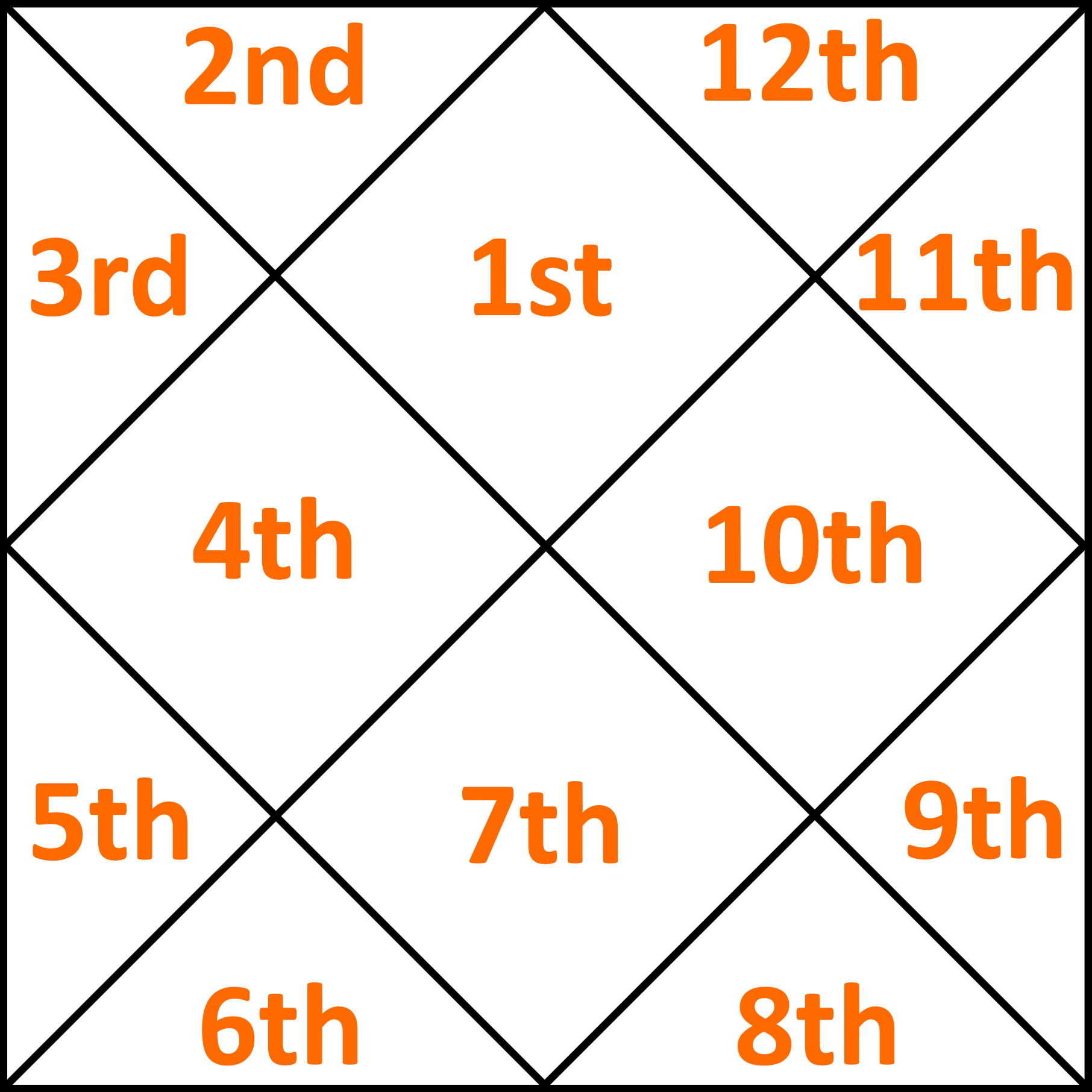
Vedic Chart - Sign Order
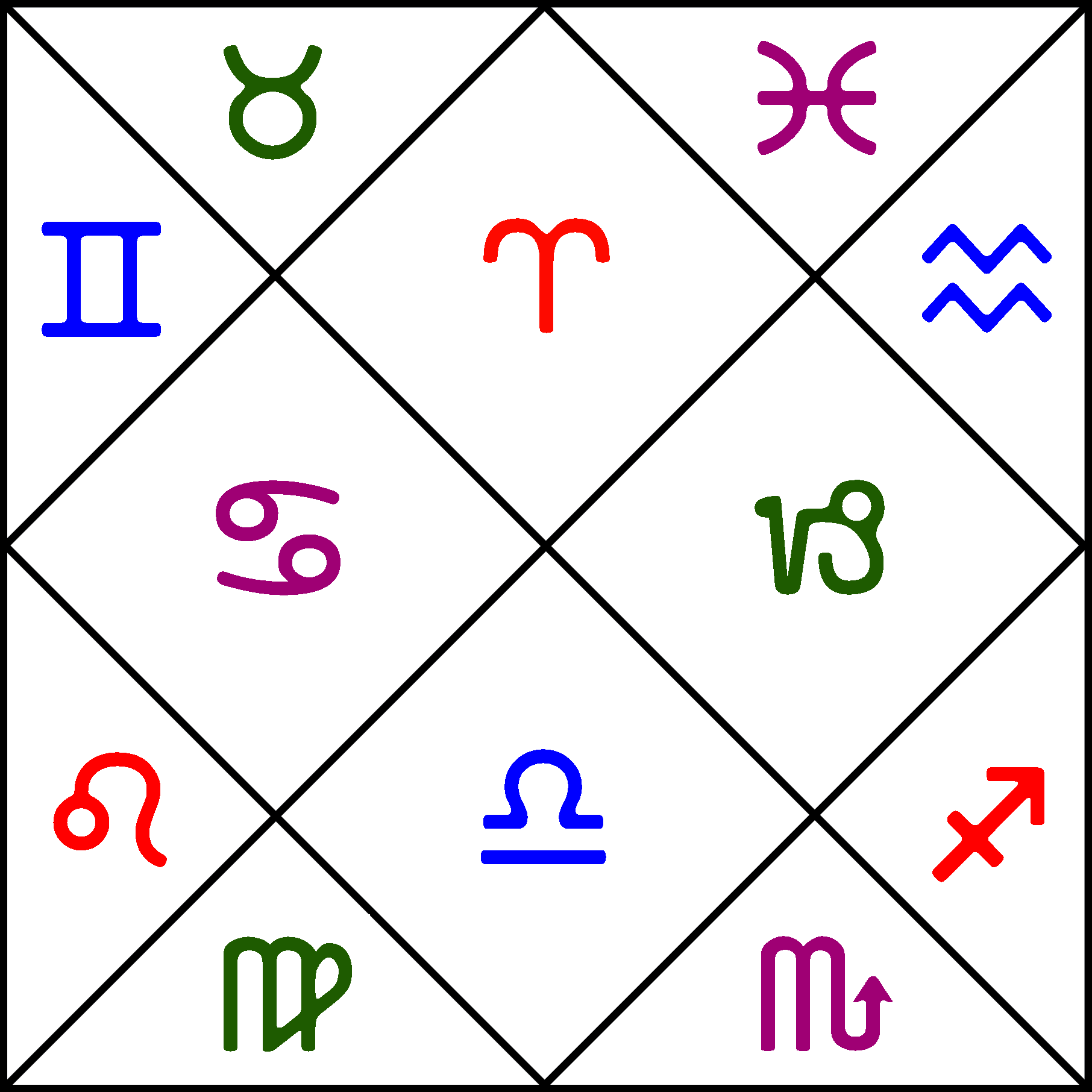
In this chart style, the 1st House is always the top diamond, and it goes in order counter clockwise, the houses never change from this position. The signs also go in counter clockwise order, illustrated here with Aries in the 1st House, Taurus in the 2nd House, Gemini in the 3rd House, etc.
Each diamond is represented as a Whole Sign House, so the placement of the Zodiac Signs shift depending on which sign is rising over the Ascendant. The sign that is rising over the Eastern Horizon becomes the sign for the entire 1st House, no matter what degree of that sign the Ascendant is on, and the signs go in order from there. For example, if Cancer were rising over the Ascendant, then Cancer would be in the 1st House, Leo would be in the 2nd, Virgo would be in the 3rd House, etc. And the placements would therefore look like this:
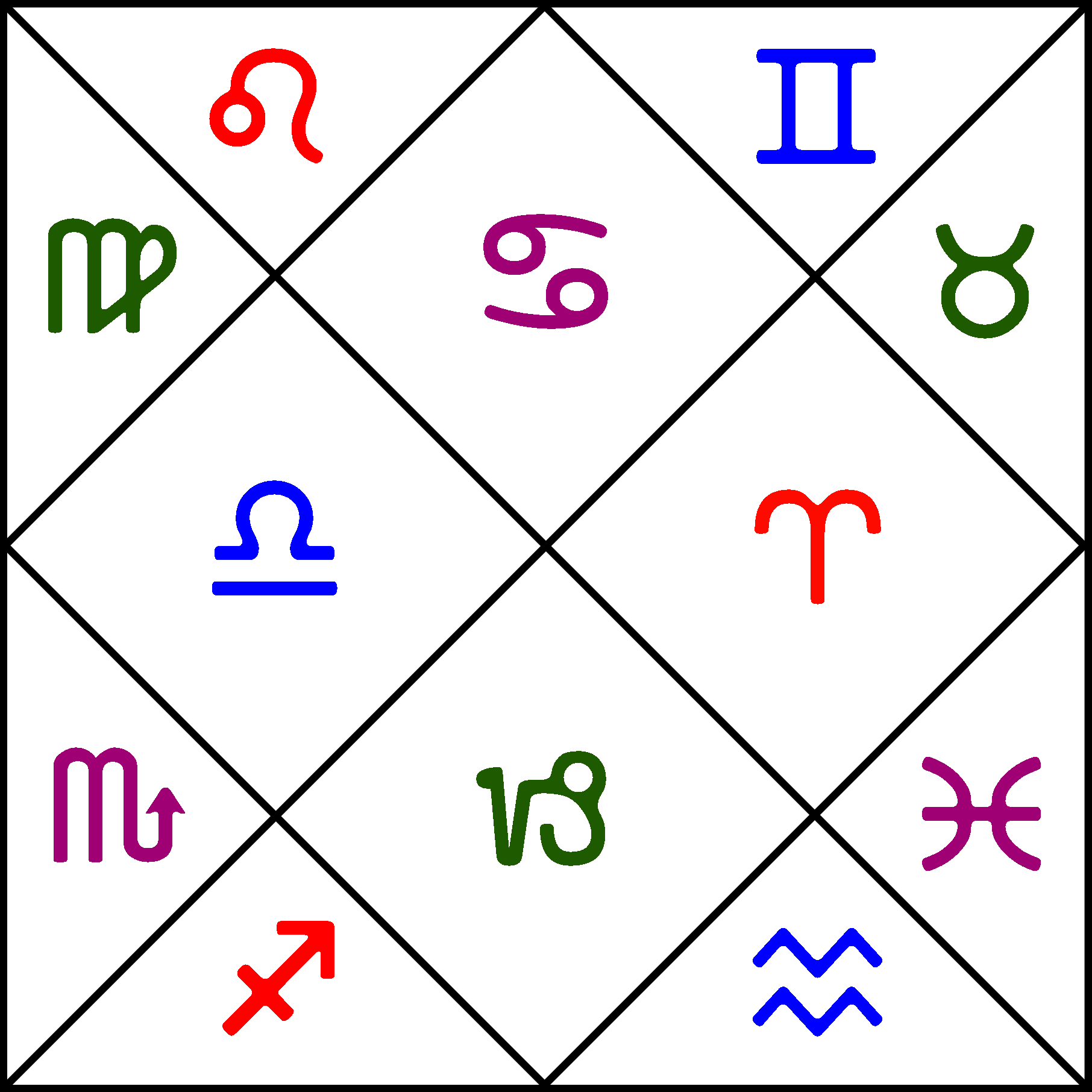
Begin With the Rising Sign
Once your birth data is plugged into the astrology software of your choice you will determine the Rising Sign based on the top diamond. The Rising Sign is the most important reference point in Vedic Astrology when analyzing a birth chart because the 1st House represents Self & Identity, it is how people perceive you, and how you perceive the world. In most Vedic astrology software the signs are referenced based on the number of their position in the Zodiac, which goes in the following order:
|
# |
Sign |
Symbol |
|
1 |
Aries |
|
|
2 |
Taurus |
|
|
3 |
Gemini |
|
|
4 |
Cancer |
|
|
5 |
Leo |
|
|
6 |
Virgo |
|
|
# |
Sign |
Symbol |
|
7 |
Libra |
|
|
8 |
Scorpio |
|
|
9 |
Sagittarius |
|
|
10 |
Capricorn |
|
|
11 |
Aquarius |
|
|
12 |
Pisces |
|
The number in the top diamond represents your Rising Sign. If there were a "12" there, it means that you would be a Pisces Rising, since Pisces is the twelfth sign in the zodiac. From there the signs would be placed in order going counter clockwise, which is the order of the Houses. So in this case Aries, represented by "1" is in the 2nd House, Taurus, represented by "2" is in the 3rd House, etc. The following chart shows the signs based on their number, and not the symbol, which is the more common Vedic approach.
Vedic Astrology Chart Example - Pisces Rising
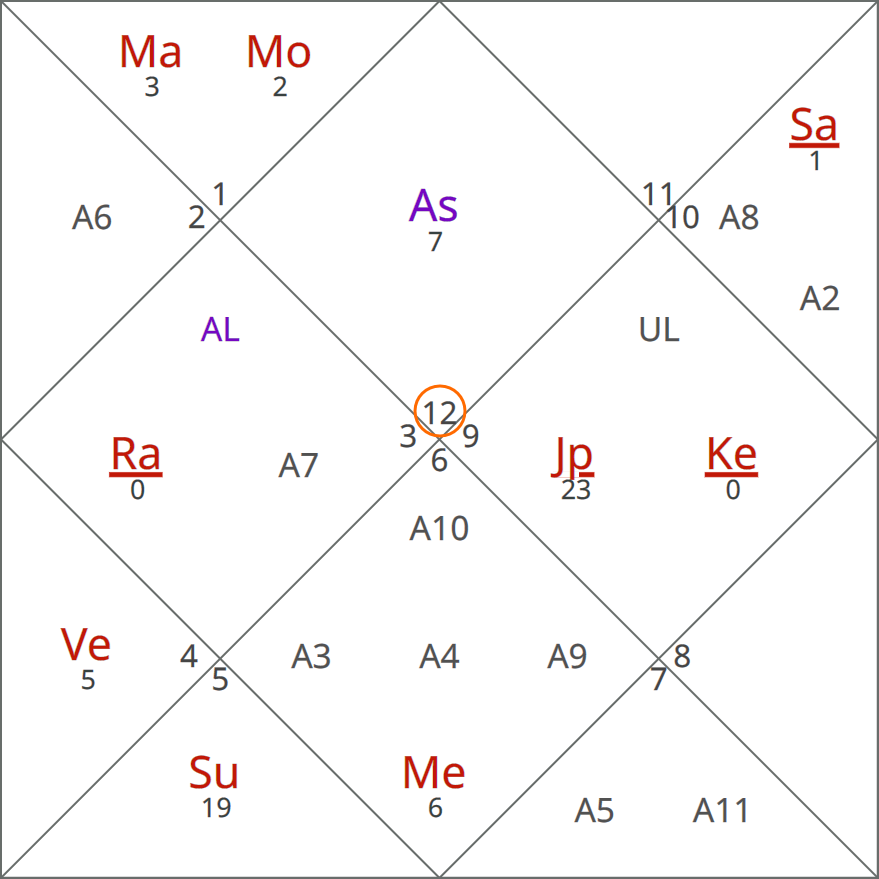
A lot of personality traits can be determined simply by knowing your Rising Sign. This is because the remainder of the signs line up in order around the zodiac, corresponding to house placement, based on what sign was rising in the East at the moment of your birth. For instance, Cancer Rising has Sagittarius in the 6th House and Pisces in the 9th House. These are the two Jupiter ruled signs, so for Cancer, Jupiter rules a difficult house in the 6th, and the most uplifting house in the 9th. This shows how Cancers can be highly inspired (Jupiter) by being of service (6th House) to something higher than themselves (9th House) in some way.
Compare this to Leo Rising, where Jupiter rules Sagittarius in the 5th House and Pisces in the 8th House. Here we see that Leos are highly inspired (Jupiter) when they follow their heart's desire (5th House) in a way that leads them to a lot of inner change, transformation, and introspection (8th House).
Vedic Astrology Chart - Cancer Rising
Sagittarius in the 6th House
Pisces in the 9th House
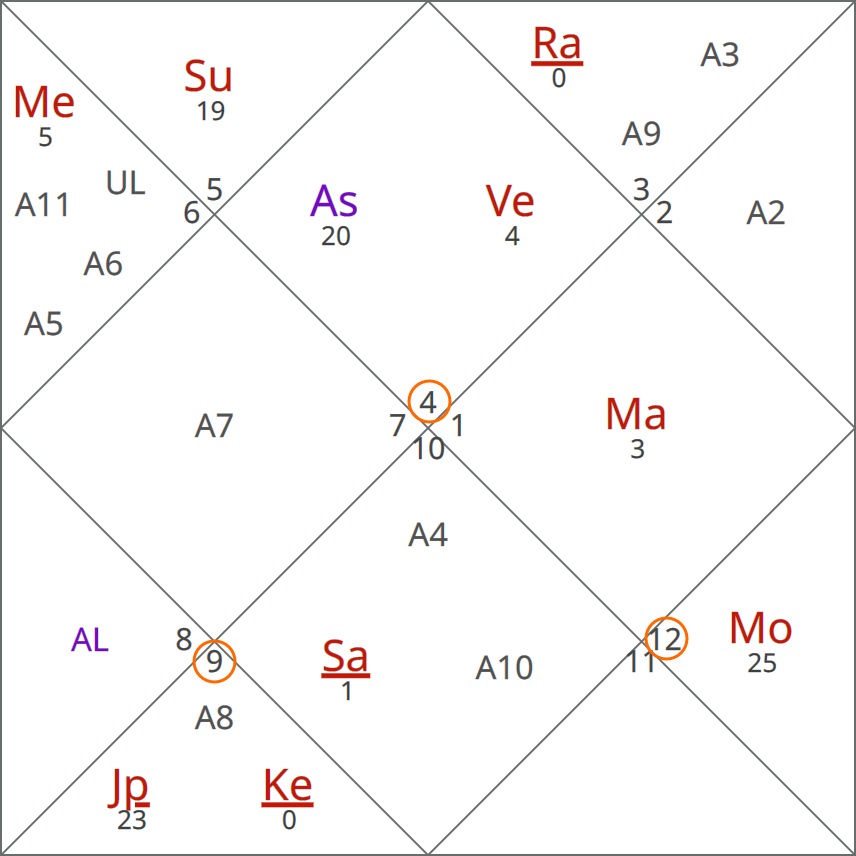
Vedic Astrology Chart - Leo Rising
Sagittarius in the 5th House
Pisces in the 8th House
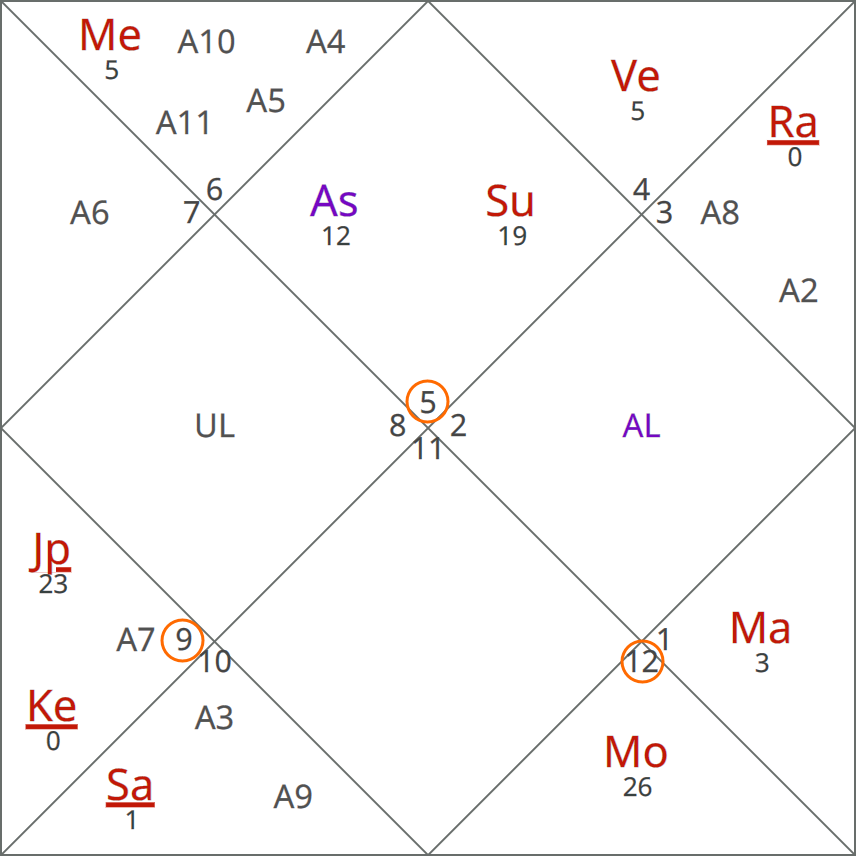
We can go deeper from here by seeing where the ruling planet of the Rising Sign has gone by assessing sign strength and planetary aspects to the ruling planet itself, in order to see how easily these innate tendencies can manifest in a person's life. There is practically no end to the depths you can go when analyzing a birth chart, but we will keep things as simple as possible here, and move on to the next logical step for understanding what we need to know to be prepared for reading a locational astrology map.
Strength and Status of the Planets
The next thing we need to know is how the planets are functioning in the natal chart, so we can determine how they will manifest their results when activated, on the map or otherwise. To do this, we will look at three things, the sign the planet is in, the house the planet is in, and any aspects to the planet.
Planets in Signs
Each planet has a range in its ability to function based on how well the characteristics of the planet match the characteristics of the sign. The range is as follows:
Exalted
- Excited - Strong ability for the planet to reach its highest level results
Own Sign / Ruler
- Comfortable - Decent ability for the planet to function at a higher level
Friendly Sign
- Content - Reasonable ability for the planet to function at some of its higher levels
Neutral Sign
- Sad - Difficult for the planet to function at a higher level
Enemy Sign
- Unhappy - Planet more likely to function at a lower level
Debilitated
- Burdened - Extremely difficult for the planet to function at a very high level
What we'll want to do here is determine how friendly of a sign placement each planet is in so that we can begin to determine how well each planet can manifest its results. Here is a list for quick reference of each planet and how well it is placed in each sign.
Sun ☉
- Exalted In: Aries
- Ruler Of: Leo
- Friendly In: Cancer, Scorpio, Sagittarius, Pisces
- Neutral In: Gemini, Virgo
- Enemy In: Taurus, Capricorn, Aquarius
- Debilitated In: Libra
Moon ☽
- Exalted In: Taurus
- Ruler Of: Cancer
- Friendly In: Gemini, Leo, Virgo
- Neutral In: Aries, Libra, Sagittarius, Capricorn, Aquarius, Pisces
- Enemy In: None
- Debilitated In: Scorpio
Mercury ☿
- Exalted In: Virgo
- Ruler Of: Gemini, Virgo
- Friendly In: Taurus, Leo, Libra
- Neutral In: Aries, Scorpio, Sagittarius, Capricorn, Aquarius
- Enemy In: Cancer
- Debilitated In: Pisces
Venus ♀
- Exalted In: Pisces
- Ruler Of: Taurus, Libra
- Friendly In: Gemini, Capricorn, Aquarius
- Neutral In: Aries, Scorpio, Sagittarius
- Enemy In: Cancer, Leo
- Debilitated In: Virgo
Mars ♂
- Exalted In: Capricorn
- Ruler Of: Aries, Scorpio
- Friendly In: Leo, Sagittarius, Pisces
- Neutral In: Taurus, Libra, Aquarius
- Enemy In: Gemini, Virgo
- Debilitated In: Cancer
Jupiter ♃
- Exalted In: Cancer
- Ruler Of: Sagittarius, Pisces
- Friendly In: Aries, Leo, Scorpio
- Neutral In: Aquarius
- Enemy In: Taurus, Gemini, Virgo, Libra
- Debilitated In: Capricorn
Saturn ♄
- Exalted In: Libra
- Ruler Of: Capricorn, Aquarius
- Friendly In: Taurus, Gemini, Virgo
- Neutral In: Sagittarius, Pisces
- Enemy In: Cancer, Leo, Scorpio
- Debilitated In: Aries
Rāhu (North Node) ☊
- Exalted In: Gemini, Taurus
- Ruler Of: Aquarius
- Friendly In: Virgo, Libra, Capricorn
- Neutral In: Pisces
- Enemy In: Aries, Cancer, Leo
- Debilitated In: Sagittarius, Scorpio
Ketu (South Node) ☋
- Exalted In: Sagittarius, Scorpio
- Ruler Of: Pisces, Scorpio
- Friendly In: Aries, Cancer, Leo, Pisces
- Neutral In: Libra, Capricorn, Aquarius
- Enemy In: Virgo
- Debilitated In: Gemini, Taurus
Planets in Houses
Once the sign placements are determined, then we can consider the functionality of the house that the planet is in.
When it comes to house functionality, certain houses are inherently difficult, while others are inherently strong. That being said, certain planets tend to function more strongly or weakly based on the nature of their significations, and how well they match the significations of the house. For instance, certain malefic planets do quite well in difficult houses. Like Mars in the 3rd House giving someone the tenacity to exert their will. Or Saturn in the 6th House helping someone overcome their enemies.
But before we outline planet strength based on house placement, we first need to understand the different meanings of the various possible positions. Here is a list with their Sanskrit name and brief description:
House Significator (Bhāva Kāraka)
Planets are at home in this position. They are comfortable producing their results here because the natural significations of the planet closely match the significations of the House.
Directional Strength (Digbala)
Planets have a stronger ability to produce their results in this position, because the strength of the angle matches the natural power of the planet. (Directional Strength can only be on one of the four angles, 1st, 4th, 7th, or 10th House)
Weakened Position (Maraṇa Kāraka Sthāna)
Planets here have a difficult time producing their desired results because the natural significations of the planet do not at all match the significations of the House.
Sun ☉
- At Home In: 1st & 10th
- Directional Strength In: 10th
- Weakened In: 12th
Moon ☽
- At Home In: 4th
- Directional Strength In: 4th
- Weakened In: 8th
Mercury ☿
- At Home In: 10th
- Directional Strength In: 1st
- Weakened In: 4th
Venus ♀
- At Home In: 7th
- Directional Strength In: 4th
- Weakened In: 6th
Mars ♂
- At Home In: 3rd & 6th
- Directional Strength In: 10th
- Weakened In: 7th
Jupiter ♃
- At Home In: 2nd, 5th, 7th, 10th, & 11th
- Directional Strength In: 1st
- Weakened In: 3rd
Saturn ♄
- At Home In: 6th, 8th, 10th, & 12th
- Directional Strength In: 7th
- Weakened In: 1st
Rāhu (North Node) ☊
- At Home In: None
- Directional Strength In: 7th
- Weakened In: 9th
Ketu (South Node) ☋
- At Home In: None
- Directional Strength In: None
- Weakened In: 2nd
You can dive much deeper into the house significations on the Astrology House Meanings page.
Planetary Aspects
Once we know the sign placement and house placement for each planet, then we can synthesize our interpretation even further by looking at the aspects.
Aspects from malefic planets are difficult and aspects from benefic planets are uplifting. Two or more aspects from malefics create a "curse," making it difficult for the cursed planet to funciton at a very high level. Two or more aspects from benefics create a "blessing," which uplifts a planet to function at a higher level. Before we get into how the planets aspect one another, first we will categorize which planets are malefics and which ones are benefics.
|
Benefic Planets |
Malefic Planets |
|
♃ Jupiter |
♄ Saturn |
|
♀ Venus |
☊ Rāhu / ☋ Ketu |
|
☿ Mercury |
♂ Mars |
|
☽ Moon |
☉ Sun |
Aspects in Vedic Astrology are calculated a little differently than in Western Astrology. Since we are using Whole Sign Houses, aspects are distinguished by a planets proximity to another house, rather than the orb of degree. To figure out the aspect in this way you simply count from the house the planet is in, to another house a certain distance apart.
To illustrate this example, Jupiter aspects houses that are five placements away, and nine placements away. These are trines, and if a planet is in one of these houses, then that planet is being aspected by Jupiter:
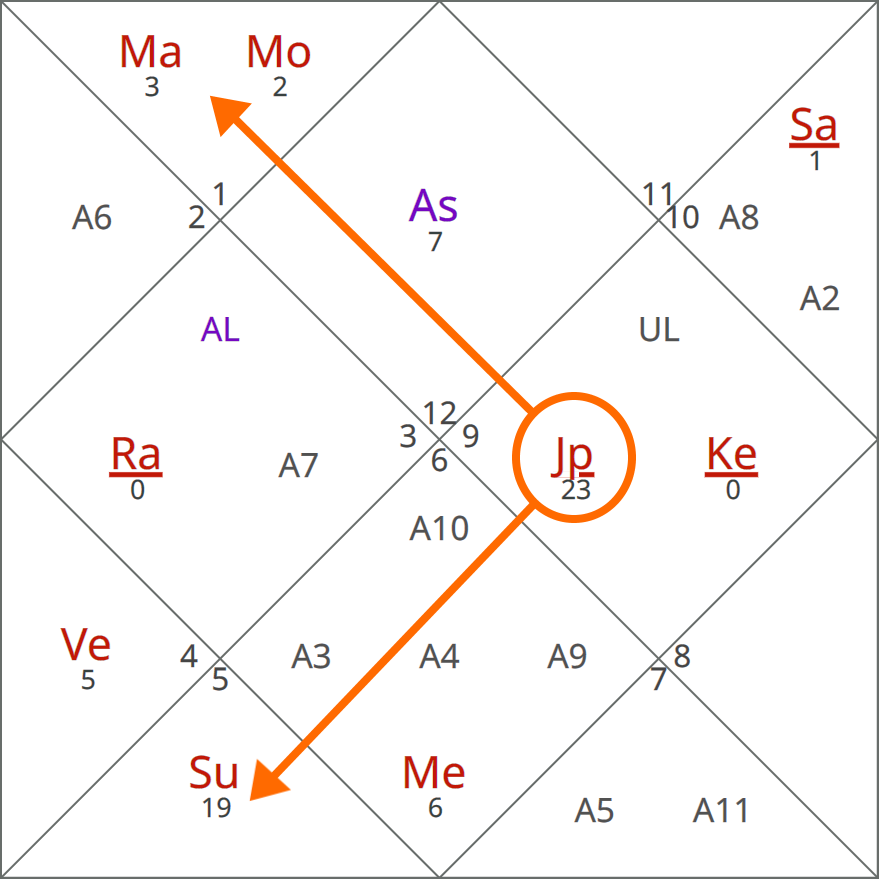
When counting the number of houses away you start with the house that the planet is in and count from there. In this example Jupiter is in Sagittarius in the 10th House, so starting with the 10th House, using an inclusive count, you would count counter clockwise through each house to arrive on the 5th house from there, which in this case is Aries in the 2nd House with Mars and Moon. You can continue counting from there to reach the 9th House from Jupiter, which is Leo in the 6th House with the Sun.
The next thing to understand is how each of the different planets cast their aspects:
Sun Aspects
Conjunction and Opposition Only
Moon Aspects
Conjunction and Opposition Only
Mars Aspects
Conjunction and Opposition
Square: 4th From and 8th From
Mercury Aspects
Conjunction and Opposition Only
Jupiter Aspects
Conjunction and Opposition
Trine: 5th From and 9th From
Venus Aspects
Conjunction and Opposition Only
Saturn Aspects
Conjunction and Opposition
Sextile: 3rd From and 10th From
Rāhu Aspects
Conjunction and Opposition
2nd From
Trine: 5th From and 9th From
Ketu Aspects
Ketu does not aspect any planets
Tying it All Together
Once you know a planet's sign placement, house placement, and any planetary aspects, then you can combine that information together to determine what kind of results that planet will bring when it is activated. Because we mainly focus on locational astrology on this site, we would use this information to determine how a planet is being activated on the locational astrology map in order to determine how that planet will manifest its energy in your life if you were to move toward one of its Astrocartography lines.
If the planet is in a friendly sign, a strong house, and has benefic aspects in your natal chart then you would expect the results to be pleasant. If the planet is in an enemy sign, a difficult house, and has malefic aspects then you would expect the results to be unpleasant. If the planet has a combination of strong and difficult placements and aspects then you would integrate them into the interpretation accordingly, like a mixture of pleasant and unpleasant results. And once you get to know the natural significations of signs, houses, planets better, then you can fine-tune your interpretation even more by knowing the flavor of the results they will bring.
Here are some examples to show how this would work in practice.
Mercury Planet Strength Examples

Lets say you want to find a place on the map that would be good for business and investing, so you decide to follow one of your Mercury lines to achieve this goal. Mercury is a benefic planet that has natural strength in these areas, but how those results will manifest for you are greatly determined by the strength of Mercury in your natal chart. Here are two scenarios that would bring markedly different results:
Example 1
Mercury in:
- Gemini
- 5th House
- Aspected by Jupiter and Mars
This would be an example of an overall strong Mercury, comfortable to produce results in its own sign of Gemini, with the fortunate and inspired decision making of the 5th House. One malefic aspect by Mars isn't too harsh, it could bring some extra energy to pursue your goals in business and investing. And an aspect from Jupiter adds fortune and optimism to your endeavors as well.
Example 2
Mercury in:
- Cancer
- 12th House
- Aspected by Mars and Saturn
This would be an example of a very difficult Mercury placement. Cancer is an enemy sign for Mercury, so already it would have a more difficult time producing its results. The 12th House is the house of loss, indicating a greater likely hood of losing your business or investments. Two malefic aspects makes things even more difficult, creating anger, frustration, and more problems to deal with. Overall a very difficult placement.
So in the first example you would happily move toward one of your Mercury lines and expect to see positive results in the realm of business and investing. In the second example you would not want to move toward one of your Mercury lines for this goal, in fact doing so would counterproductive to your goal!
Related Pages
Astrology House Meanings
The houses in astrology represent different areas of life, learn the twelve astrology house meanings and how the planets manifest their energy through each.
Astrology Map Lines
Astrology map lines are a visual representation of the planetary placements in your birth chart laid over a map to determine their locational emphasis.
"Inside the Sun" Astrology Newsletter Signup
*By signing up for this newsletter you agree to receive periodic emails from insidethesun.com.
You can unsubscribe at anytime.
